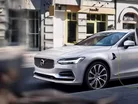Volvo Cars calls on automotive industry to standardise car charging

Currently, there are a range of car charging options available for motorists but if electric vehicles are to become even more popular, a standardised infrastructure needs to be built. Currently, motorists have to check available chargers fit their cars before heading to one to plug in.
As well as different connectors, there’s also a variety in charging speeds and how people pay for them. To get access to a full charging network, EV owners need multiple cards and apps with which to pay for them.
Dr Peter Mertens Senior Vice President of Research and Development at Volvo believes the automotive industry should be working towards a global standard in car charging. He said: “We see that a shift towards fully electric cars is already underway, as battery technology improves, costs fall and charging infrastructure is put in place. But while we are ready from a technology perspective, the charging infrastructure is not quite there yet. To really make range anxiety a thing of the past, a globally standardised charging system is sorely needed.”
Volvo has decided to throw its weight behind the Car Charging Initiative, a consortium of stakeholders that was founded to establish their Combined Charging System (CCS) as the standard for charging battery-powered vehicles.
The Combined Charging System, which will offer both regular and fast-charging capabilities, makes electric car ownership increasingly practical and convenient – especially in urban environments, which are ideal for electric vehicles.
It combines single-phase with rapid three-phase charging, using alternating current at a maximum of 43 kilowatts (kW), as well as direct-current charging at a maximum of 200 kW and the future possibility of up to 350 kW – all in a single system.
The Charging Interface Initiative is currently in the process of drawing up requirements for the evolution of charging-related standards and certification for use by car makers around the globe.
“We are very happy to support and be involved in the setting of standards for electric vehicle charging systems. The lack of such a standard is one of the main obstacles for growing electric vehicles’ share of the market,” said Dr Mertens.
Follow @ManufacturingGL
- How They Produce Multiple Drive-Types at Porsche LeipzigDigital Factory
- Scania Takes Vehicular Remanufacturing Beyond AftermarketSustainability & ESG
- Panasonic Energy & Mazda Partner On Lithium-Ion BatteriesProduction & Operations
- Geely, JAC & Chery, Algeria & The New Silk RoadProduction & Operations

